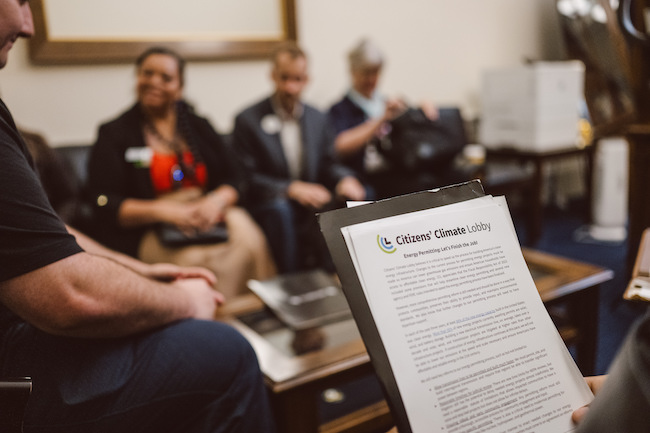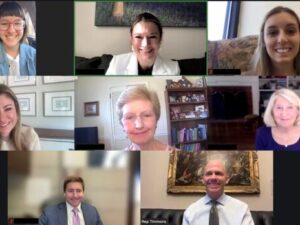Our lobbying asks at the end of the 118th Congress
By Flannery Winchester
This year’s fall lobbying comes at a critical time. The results of the 2024 election and the impending power shifts in Washington have changed calculations on Capitol Hill around several policies we support. But there are still several weeks left of the 118th Congress before those power shifts actually take place. It’s known as the lame duck period.
“The lame duck is always a unique opportunity at the end of a Congress,” explains Ben Pendergrass, CCL’s VP of Government Affairs, because there are some lame duck members of Congress that are on their way out of office, and sometimes there’s also a lame duck president, as we have now. “But Congress usually still has stuff they need to do — and the election has an impact on what’s doable.”
Luckily, Ben says, “We have an opportunity in the lame duck to still get some climate wins.”
Our virtual lobby week, taking place after our Fall Virtual Conference this past weekend, will give CCL volunteers hundreds of chances to influence climate policy progress in the final weeks of this Congress.
Here’s a closer look at what we’re lobbying Congress for this time. Watch the rundown from our Government Affairs team, or read on for a recap.
A primary focus on permitting reform
Our primary ask is for Congress to pass the Energy Permitting Reform Act of 2024. Our volunteers will bring this ask to all offices they meet with: both Democrats and Republicans, and in the House and Senate. “We want every single member to hear why this is an important bill and why this is an important opportunity,” Ben says.
Ben reviewed the modeling for the Energy Permitting Reform Act, done by experts at Princeton Zero Lab, Resources for the Future (RFF), Third Way, and Rocky Mountain Institute, which shows that the bill will significantly reduce climate pollution. How? “One of the best ways to reduce emissions is to build clean energy faster,” Ben explains, “and we all know we’re not going to be able to hit our climate goals without transmission expansion. This bill does that.”
It could cut American climate pollution between 2030 and 2050 by up to 25%, but conservatively by around 10% — huge progress, if Congress can lock it in.
“There’s definitely a bipartisan path” for this bill, Ben adds, and our lobbying could help push this bipartisan agreement across the finish line.
Defending climate provisions in the Inflation Reduction Act
Our co-primary ask is for Congress to defend the clean energy provisions of the Inflation Reduction Act. CCL Policy Fellow Danny Richter explained the context around this ask.
“The Inflation Reduction Act was passed only with Democratic votes. It’s Biden’s signature achievement, and Trump has railed against it in the campaign,” Danny explains.
Plus, he reminds us, “The IRA represents a lot of spending, and there will be a need for money next Congress to extend the Tax Cuts and Jobs Act, which is also known as the ‘Trump tax cuts.’” Cutting back that IRA spending could fund some of those tax cuts — though the amount of spending in the IRA doesn’t even come close to the projected cost of the tax cuts. Still, Danny says, “This is why we think the Republicans are going to go after the IRA.”
It could happen through the mechanism of budget reconciliation, which could take some time, so it’s important to lay the groundwork for a strong defense now. Our meetings will remind Republican offices that the IRA funding is good for business, creates jobs and investment in rural communities, drives health benefits by reducing pollution, and more.
“You’re going to plant that flag in the ground and say, ‘We, your constituents, want you to keep this because we like it for all these reasons. We like these benefits, and we don’t want them to go away,” Danny says.
And remember, 18 congressional Republicans are already making this argument, too. Let’s add to the chorus of voices speaking up for this important legislation.
Support offshore wind energy and coastal resilience
Last but not least, Ben says, “If you’ve been around for a couple years, you probably remember the RISEE Act.” This bill is our secondary ask, and we hope to see Congress include it in any year-end legislative package that emerges.
The RISEE Act would create a revenue-sharing model for offshore wind energy, directing money to coastal infrastructure and resiliency efforts, making this clean energy source even more economically attractive to coastal states.
Let’s lobby!
Our virtual lobby week runs Dec. 9-13, and our volunteers have nearly 300 meetings scheduled. Stay tuned for updates on our final meeting count and what an impact this lobbying push makes on climate policy here at the end of the 118th Congress.






